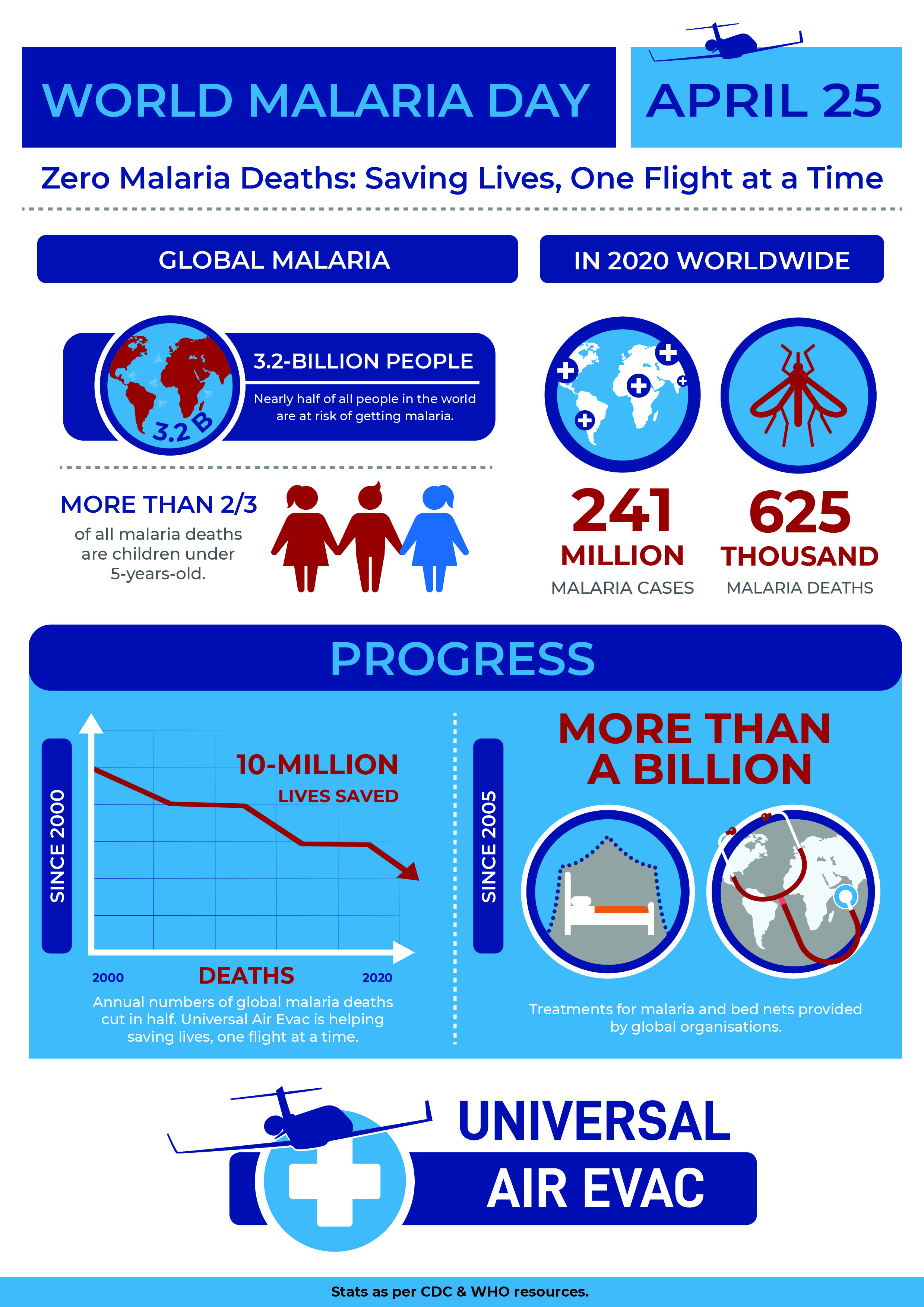World Malaria Day

Unpacking the Ins and Outs of Malaria This World Malaria Day
World Malaria Day is observed every year on April 25th. It is an opportunity to raise awareness about the deadly disease, which affects millions of people worldwide. Malaria is a serious and widespread infectious disease caused by the Plasmodium parasite. According to the World Health Organisation (WHO), there were an estimated 619,000 malaria deaths globally in 2021 compared to 625,000 in 2020. In 2019, the number of deaths stood at 568,000. Malaria cases continued to rise between 2020 and 2021, but at a slower rate than in the period 2019 to 2020 with young children and pregnant women being the most vulnerable.
So, if you are travelling and are concerned about malaria, what do you need to look out for? We took a look at the prevention, symptoms and treatment of malaria. We also unpacked how an air ambulance can assist you should you contract malaria while in another country and why travel insurance is critical, even for a short sunny holiday to a neighbouring country.
Prevention of Malaria
Preventing malaria requires a multifaceted approach that requires you to do some research before travelling to high-risk areas. Make sure you know which countries are high-risk before travelling to them. The best way to prevent malaria is to avoid getting bitten by mosquitoes. This can be done by using insect repellent, wearing long-sleeved clothing, and sleeping under mosquito nets. Other preventative measures include taking anti-malarial medication before, during, and after travel to high-risk areas, in consultation with your doctor.
One of the most effective ways to prevent malaria is through the use of insecticide-treated bed nets. These bed nets create a physical barrier between people and the mosquitoes that carry the malaria parasite. Insecticide-treated bed nets have been shown to reduce malaria transmission by up to 50% and are especially important for protecting young children and pregnant women, who are at increased risk of severe disease.
Symptoms of Malaria
Malaria can cause a wide range of symptoms, which can vary in severity depending on the type of malaria parasite, the individual's immunity, and other factors. The most common symptoms of malaria include fever, chills, headache, muscle pain, and fatigue. These symptoms can appear 7-30 days after a person is bitten by an infected mosquito. Malaria can cause other symptoms such as nausea, vomiting, diarrhoea and anaemia.
Severe malaria can lead to complications such as seizures, kidney failure, and coma, and can be life-threatening if left untreated. It is important to seek medical attention promptly if you experience any symptoms of malaria, especially if you have recently travelled to an area where malaria is endemic.
Treatment of Malaria
The treatment of malaria depends on the type of malaria parasite and the severity of the disease. The most common medications used to treat malaria are antimalarial drugs, which work by killing the parasites that cause the disease. The choice of antimalarial drug depends on several factors, including the species of the parasite, the severity of the infection, the age and weight of the patient, and the location of the infection.
In addition, some strains of the malaria parasite have developed resistance to certain antimalarial drugs, which can complicate treatment. Supportive care such as fluids and electrolytes may be necessary for patients with severe disease. Efforts to develop new and more effective treatments for malaria are ongoing, as the fight against this deadly disease continues.
Air Ambulance Repatriation and Travel Insurance for Malaria Patients
If a patient is diagnosed with malaria while travelling abroad, they may need to be repatriated back to their home country for further treatment. In this case, an air ambulance may be used to transport the patient back home. In severe cases, the patient will be taken to a suitable facility for stabilisation and treatment first, before being transported back to their home country.
Patients with malaria who require repatriation by air ambulance should be aware of the potential risks involved, such as the effects of high altitude on their condition. The air ambulance staff will be trained to manage these risks, but the patient should also inform the medical team of their medical history and any medication they are taking. Patients who require medical evacuation may need specialised care during transport, including the administration of intravenous medications and oxygen therapy. Patients with severe malaria may also require blood transfusions or other interventions to manage their symptoms.
The air ambulance services will have the appropriate equipment, such as ventilators and specialised monitors, to ensure that patients receive the care they need during transport. Travel insurance is essential for anyone travelling to a high-risk area for malaria. It is important to ensure that the insurance policy covers medical evacuation by air ambulance, as this can be a costly service.
The Bottom Line
World Malaria Day is a reminder of the need to prevent, diagnose and treat this deadly disease. Travellers to high-risk areas should take all necessary precautions to avoid getting bitten by mosquitoes and seek medical attention immediately if they experience any symptoms.
For those diagnosed with malaria while abroad, repatriation by air ambulance may be necessary, and travel insurance is essential to cover the costs involved.


